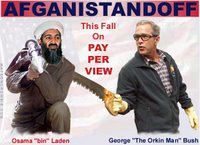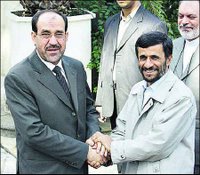
 As a result, our adversaries in Talibanistan and Iran have 'gotten the draw' on our Cowboy-in-Chief.
As a result, our adversaries in Talibanistan and Iran have 'gotten the draw' on our Cowboy-in-Chief.Let's engage in more quanitative analysis.
Content analysis is a standard methodology in the social sciences on the subject of communication content. Content analysis enables the researcher to include large amounts of textual information and systematically identify its properties, e.g. the frequencies of most used keywords (KWIC meaning "KeyWord In Context"). From this exercise, by identifying the dominant messages and subject matter within the text, we can derive the thinking and logic of the author or speaker.
For example, here are some words from George W. Bush, speaking at the Cincinnati Museum Center on Oct 7th, 2002:
. . . .The threat comes from Iraq. It arises directly from the Iraqi regime's own actions -- its history of aggression, and its drive toward an arsenal of terror.You get the drift. This speech lasted 29 minutes, contained 3,390 words and only one of them was "Iran", (mentioned as a past victim of Saddam's aggression).
. . . . some ask why Iraq is different from other countries or regimes that also have terrible weapons. While there are many dangers in the world, the threat from Iraq stands alone -- because it gathers the most serious dangers of our age in one place. Iraq's weapons of mass destruction are controlled by a murderous tyrant who has already used chemical weapons to kill thousands of people. This same tyrant has tried to dominate the Middle East, has invaded and brutally occupied a small neighbor, has struck other nations without warning, and holds an unrelenting hostility toward the United States.
By its past and present actions, by its technological capabilities, by the merciless nature of its regime, Iraq is unique.
Some ask how urgent this danger is to America and the world. The danger is already significant, and it only grows worse with time . . . .
Some have argued that confronting the threat from Iraq could detract from the war against terror. To the contrary; confronting the threat posed by Iraq is crucial to winning the war on terror . . . .
Terror cells and outlaw regimes building weapons of mass destruction are different faces of the same evil. Our security requires that we confront both. And the United States military is capable of confronting both . . . .
The lives of Iraqi citizens would improve dramatically if Saddam Hussein were no longer in power, just as the lives of Afghanistan's citizens improved after the Taliban . . . .
"Afghanistan" appears twice. Once as a source of/link to al Qaeda and once as it appears in the excerpt above.
What can we conclude from this exercise in content analysis?





















With regard to this, read my review of a review of Frank Rich's
ReplyDeleteThe Greatest Story Ever Sold.